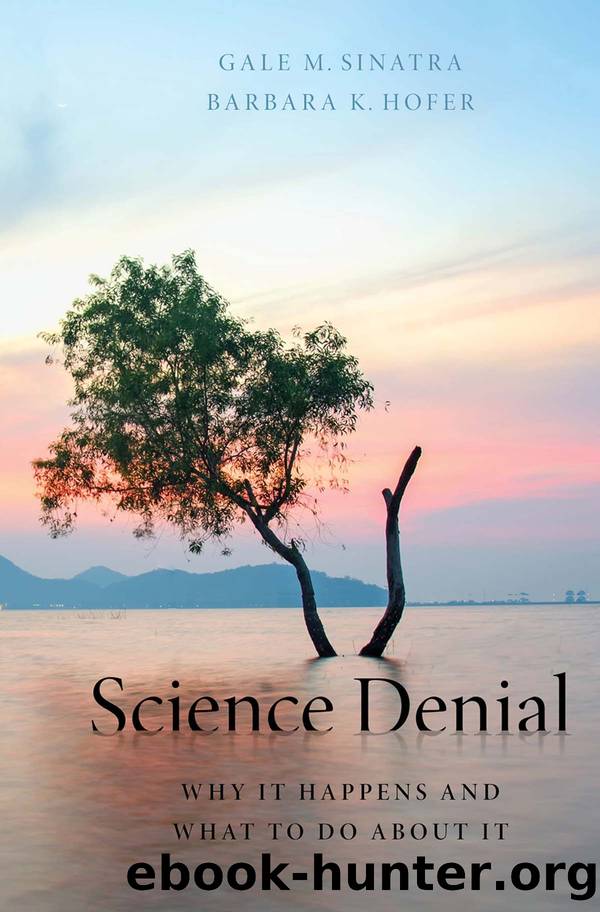Science Denial: Why It Happens and What to Do About It by Gale Sinatra & Barbara Hofer

Author:Gale Sinatra & Barbara Hofer [Sinatra, Gale & Hofer, Barbara]
Language: eng
Format: epub
Tags: Psychology, Cognitive Psychology & Cognition, science, Cognitive Science
ISBN: 9780190944681
Google: K80vEAAAQBAJ
Publisher: Oxford University Press
Published: 2021-11-15T00:30:19.553551+00:00
The Development of Epistemic Cognition
Individuals develop their ideas about knowledge and knowingâtheir epistemic cognitionâover time and in patterned ways. A simple way to understand the progression is through a developmental model of three progressive worldviews.4 Imagine this late-night conversation in a college dorm, where a student studying for an exam with others in his class raises the topic of evolution:
jay:I just canât buy what weâre being taught about evolution, and I know itâs not true because my pastor, my parents, and the Bible all say that humans were created in their own form, and I have always believed what they say. What Iâm hearing in class has to be wrong.
rick:But Jay, people are entitled to their own opinions! Some people believe in evolution and some people donât. Everyone has the right to decide.
emily:Guys, thereâs scientific evidence for evolution! This isnât just some wild idea, itâs something scientists have studied carefully, and the theory is supported. Let me explain how we know this.
Exemplified in this simplistic dialogue are three discrete ways of knowing that researchers have identified as characterizing a developmental progression: absolutism (Jay), or thinking in absolute terms; multiplism (Rick), entertaining multiple points of view as equally valid; and evaluativism (Emily), evaluating and seeking to substantiate oneâs views.5
Those whose ways of knowing are absolutist are likely to think in black and white, dualistic, dichotomous terms. Knowledge is viewed as unquestioningly objective, certain, and true, handed down intact from authority. Students who view knowledge in this way are likely to see it as a collection of facts, to expect teachers and other authorities to know everything worth knowing, and to view learning as the task of memorizing and repeating back.6 There are no gray areas and no role for interpretation or subjectivity. For some individuals this dualistic thinking prevails into adulthood. They seek certainty, trust authorities absolutely, and dismiss ambiguity. Science deniers, for example, have been described as engaging in dichotomous thinking, imagining that either facts are known with certainty or there is simply inconclusive controversy.7 They may rely on known authorities without evaluating their expertise or expecting evidence as a basis for their claims. They may be averse to ambiguity and locked in the stage of absolutism that many outgrow in adolescence. Contemporary examples abound.
Absolutist thinking starts to crumble when individuals recognize that there might be different perspectives on the same topic, that knowledge is not just handed down intact but is constructed by the knower, and that not everything can be known with complete certainty. This can usher in a worldview of multiplism, a form of radical uncertainty, where knowledge is subjective, based on interpretation and opinion. All opinions seem equally valid, and each person is entitled to think what they wish, with no means to evaluate conflicting ideas. In Barbaraâs studies of college studentsâ thinking about evolution, for example, those who held multiplist views were less likely to accept the scientific consensus on evolution than were those who thought evaluatively, the stage that follows. They were also more
Download
This site does not store any files on its server. We only index and link to content provided by other sites. Please contact the content providers to delete copyright contents if any and email us, we'll remove relevant links or contents immediately.
| Administration & Medicine Economics | Allied Health Professions |
| Basic Sciences | Dentistry |
| History | Medical Informatics |
| Medicine | Nursing |
| Pharmacology | Psychology |
| Research | Veterinary Medicine |
Machine Learning at Scale with H2O by Gregory Keys | David Whiting(4314)
Fairy Tale by Stephen King(3401)
Will by Will Smith(2928)
Hooked: A Dark, Contemporary Romance (Never After Series) by Emily McIntire(2561)
Rationality by Steven Pinker(2368)
Friends, Lovers, and the Big Terrible Thing by Matthew Perry(2234)
The Becoming by Nora Roberts(2207)
Love on the Brain by Ali Hazelwood(2080)
A Short History of War by Jeremy Black(1851)
The Strength In Our Scars by Bianca Sparacino(1847)
HBR's 10 Must Reads 2022 by Harvard Business Review(1847)
A Game of Thrones (The Illustrated Edition) by George R. R. Martin(1751)
Leviathan Falls (The Expanse Book 9) by James S. A. Corey(1747)
515945210 by Unknown(1669)
Bewilderment by Richard Powers(1623)
443319537 by Unknown(1562)
The 1619 Project by Unknown(1464)
The Real Anthony Fauci: Bill Gates, Big Pharma, and the Global War on Democracy and Public Health (Childrenâs Health Defense) by Robert F. Kennedy(1410)
All About Love: New Visions by bell hooks(1356)
